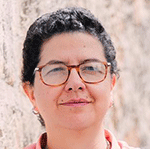Interview with Silvia Restrepo, Vice-President for Research and Creation, University of the Andes, new member of the Science Council.

Why did you become a researcher?
I never really asked myself that question. It came very naturally. At first I wanted to study the animal world, then I became interested in plants. Very early in my studies, I made this choice, I took a science baccalaureate. More than philosophy dissertations, for example, I have always been attracted to science.
What is a "scientific community" in your opinion?
A scientific community means different realities... it can be very small, very large. Unfortunately, we researchers specialise a lot. So we tend to be grouped into relatively small communities, sharing a common language. As a plant pathologist, I would like to be able to talk to people from other research fields, in a larger, systemic community. I don’t like to talk about “agriculture”, for example, but rather about “farming systems. I think it is important to include social sciences in my scientific community.
What do you expect from the Foundation’s Science Council (SC), and what ambition do you have in integrating it?
I am very honoured to be part of the Science Council. I have known Agropolis Fondation for a very long time, having received the Louis Malassis prize the year it was launched, in 2010. I am also a member of the IRD’s Strategic Council (whose President and CEO, Valérie Verdier, directed my thesis) and I work with CIRAD. I expect the SC to learn from other scientists, other people working on agricultural issues. There are different visions, some more ecologist, others more environmentally oriented, etc. I want to learn from my colleagues. I also expect the science council to be very rigorous in its decisions. Finally, I hope that it will help guide Agropolis Fondation so that it contributes as much as possible to the sustainable development goals.